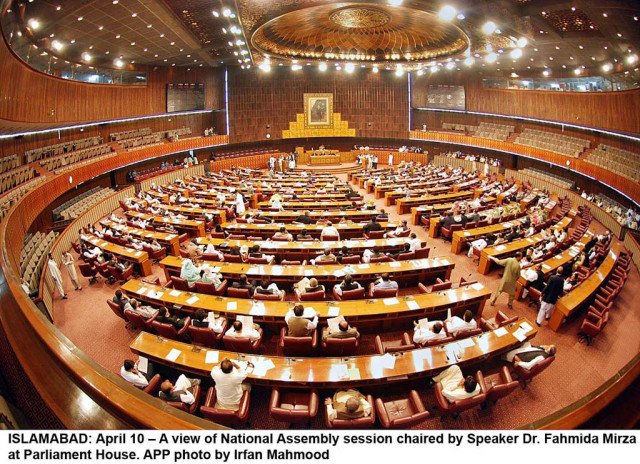National Assembly session called on July 2 to pass PPO
Committee on interior will table the bill on June 30.

It seems that the government has succeeded in pacifying the angry opposition and changed its views on the controversial Protection of Pakistan Ordinance [PPO] as it summons a special session of the National Assembly to pass the proposed legislature on July 2.
“In exercise of the powers conferred by clause (1) of Article 54 of the Constitution of Islamic Republic of Pakistan, the president has been pleased to summon the National Assembly to meet in the Parliament House, Islamabad on Wednesday, the 2nd July, 2014,” said a statement issued by the National Assembly. On June 30, the upper house will also meet and a report about the passage of the bill will be tabled by Senator Talha Mehmood, the head of the standing committee on interior affairs.
The Senate standing committee on interior affairs had passed the controversial PPO amendment bill on June 25. The PPO will initially be enforced for two years.
The committee has unanimously approved the amendment bill under which the authority to shoot miscreants or suspected persons will rest with the officers of Grade-15 and above. Once the business is completed in the Senate, the bill will go to the National Assembly for approval.
“It is not special session but in a way it can be considered as special since it will have one agenda: the passage of the PPO,” a senior official at the NA Secretariat told The Express Tribune on Saturday.
Responding to a question about the agenda of the day, the official said: “So far, we have nothing except the PPO. However, there will be a question hour as per routine practice.”
Both the upper and lower houses do not meet during the month of Ramazan but convening of both the sessions is a special arrangement of the government for the PPO.
Published in The Express Tribune, June 29th, 2014.



















COMMENTS
Comments are moderated and generally will be posted if they are on-topic and not abusive.
For more information, please see our Comments FAQ